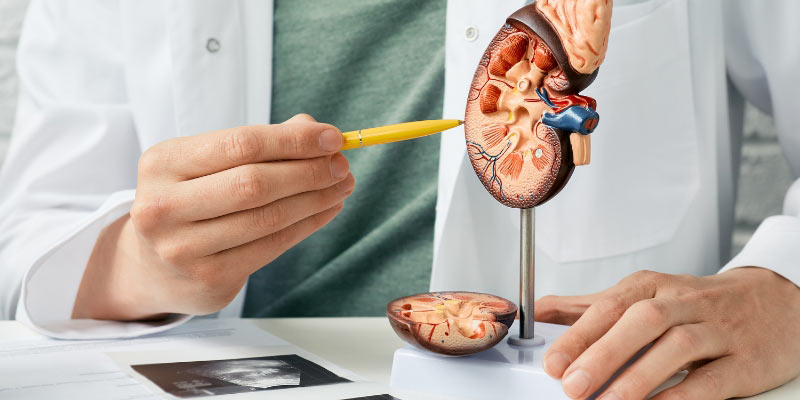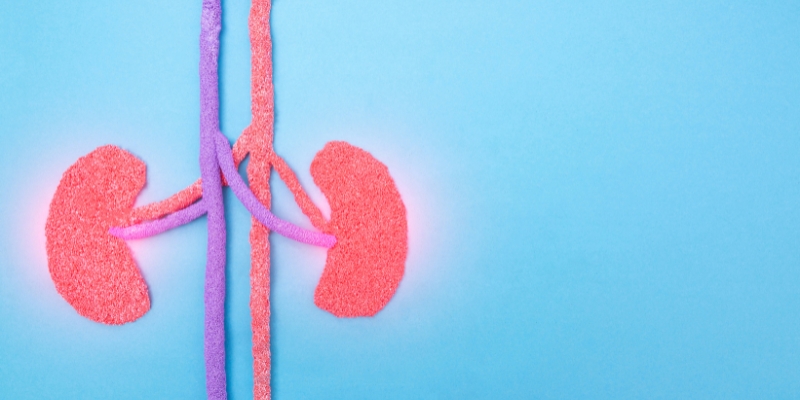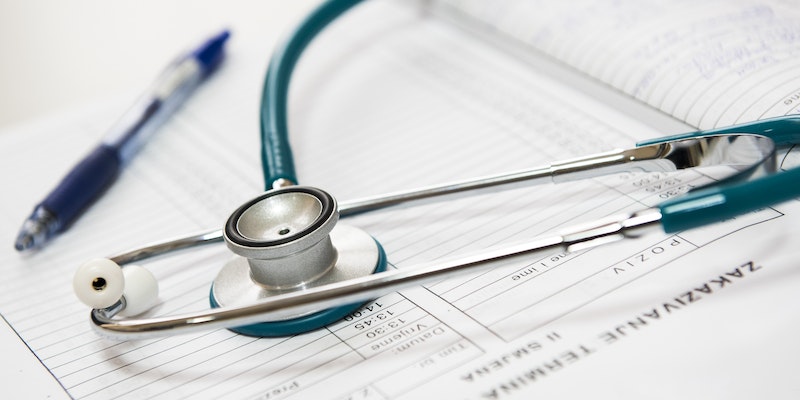
The kidneys are critical to health as the body's natural filtration mechanism. This thorough essay will cover kidney disease's kinds, causes, symptoms, diagnostic procedures, treatment choices, prevention measures, and significant influence on quality of life.
Understanding kidney illness is crucial because these amazing organs do more than eliminate waste. The kidneys on each side of the spine below the ribcage regulate blood pressure, electrolytes, and red blood cell formation. Millions of microscopic nephrons filter blood, eliminating waste and retaining electrolytes and water. The body's chemical balance and health depend on this complex filtering mechanism.

Symptoms and Signs of Kidney Disease:
Kidney illness is complicated and has several symptoms that vary by kind and stage. Untreated kidney illness may cause serious problems. Therefore, early identification and treatment are crucial. We discuss kidney disease symptoms, from mild early signals to more severe and advanced symptoms.
Early kidney disease may proceed quietly without symptoms. This stealthy development makes early identification difficult, although frequent check-ups are essential, particularly for diabetics and hypertensives. However, similar indications may appear when kidney function diminishes. Anemia caused by renal erythropoietin deficiency causes fatigue early on. The kidneys' failure to control fluid balance may cause edema, leg, ankle, or facial swelling.
Urine frequency and color changes are notable. Urinating may increase or decrease, and urine may be frothy or colored. Due to biochemical abnormalities induced by renal dysfunction, people may have trouble focusing. Since the kidneys regulate blood pressure, renal illness often causes high blood pressure. A dangerous cycle might result from hypertension and worsening renal disease.
In severe renal disease, symptoms might worsen, lowering the quality of life. Waste products and poisons in the bloodstream may cause nausea and vomiting. Electrolyte imbalances like potassium and calcium may cause painful muscle cramps. Waste buildup may cause itching or pruritus, which is worse in advanced instances.
These symptoms need immediate medical attention. Untreated kidney illness might cause severe bodily system issues. Kidney dysfunction may cause fluid retention and excessive blood pressure, straining the cardiovascular system and causing heart disease. Common complications like anemia may cause tiredness, weakness, and impaired tissue oxygen supply. Bone disease, caused by calcium and phosphorus imbalances, is common and increases fracture risk. Peripheral neuropathy causes discomfort, numbness, and muscular weakness from nerve injury.
In conclusion, kidney disease symptoms and indicators must be recognized for early identification and treatment. Early intervention may decrease disease development and reduce consequences significantly influencing health and quality of life. For preventive kidney health, get medical treatment and kidney function testing if you or someone you know has any of these symptoms.
Types of Kidney Disease:
Kidney illness covers several disorders that impact these critical organs. CKD, which causes kidney function to decline over time, is one of the most common forms. CKD commonly develops over the years and is connected to diabetes and hypertension. In contrast, acute kidney injury (AKI) causes a quick and severe loss of kidney function. Injuries, severe illnesses, or drug responses may cause it. Polycystic Kidney Disease (PKD) is a hereditary condition that causes kidneys to expand and lose function due to fluid-filled cysts. Other kidney diseases, such as kidney stones, glomerulonephritis, and nephrotic syndrome, have different origins and symptoms and need different treatments.
Causes and Risk Factors:
Prevention and therapy of kidney disease need an understanding of its many causes. Diabetes is a significant kidney disease cause. CKD may result from prolonged high blood sugar levels damaging renal filtration units. High blood pressure is another factor. Uncontrolled hypertension strains renal blood arteries, reducing kidney function. Genetics can affect kidney health. Some kidney illnesses, including PKD, are inherited. Sepsis and other severe illnesses may cause AKI, a fast loss in kidney function. Certain drugs may also damage the kidneys if misused or unsupervised. Managing kidney disease requires recognizing and treating risk factors such as family history, obesity, smoking, and certain medical disorders.
Diagnosis and Screening:
Medical history, physical exams, and various diagnostic procedures are needed to diagnose renal disease. Serum creatinine and GFR assays help evaluate kidney function. Urinalysis reveals urine composition anomalies, revealing kidney health. Imaging investigations like ultrasounds and CT scans provide comprehensive kidney pictures that aid diagnosis. People at risk of renal disease need frequent kidney function tests. Early identification allows prompt intervention, improving results and quality of life.
Treatment and Management:
Kidney disease therapy depends on the kind and stage. Dietary changes, salt reduction, and weight control are commonly needed to treat renal disease. Blood pressure, blood sugar, and renal disease problems may be treated with medications. Dialysis or kidney transplantation may be needed in extreme instances of renal failure. Dialysis temporarily replaces kidney function by filtering blood waste and excess fluids. Alternatively, transplantation replaces a damaged kidney with a healthy one from a live or dead donor. Kidney disease treatment requires ongoing monitoring and management to avoid worsening and optimize health.

Prevention and Lifestyle:
A healthy lifestyle may considerably minimize kidney disease risk, even if certain risk factors are uncontrollable. Maintaining hydration, eating a balanced diet, limiting alcohol, stopping smoking, and controlling diabetes and hypertension are ways to improve kidney health. Weight control and exercise are also essential kidney disease preventive strategies.
Impact on Life Quality:
Kidney illness, especially severe stages, may significantly influence quality of life. Managing physical and emotional issues is difficult. Seeking medical aid, spending time with family, and joining support groups may help people cope with the sickness. Management of renal illness must include emotional awareness and treatment.
Research and Advancements:
Kidney disease research constantly increases diagnostic accuracy, treatment choices, and patient outcomes. Kidney disease treatment may benefit from regenerative medicines and less invasive methods. These advancements may lead to more effective and individualized therapies in the future, so healthcare practitioners and patients must stay informed.
Kidney Disease Stages:
Each kidney disease stage has its own features and patient care consequences. GFR, a renal function indicator, classifies kidney disease stages. Stages 1 and 2 may be overlooked due to minor symptoms. However, Stage 3 symptoms worsen as renal function falls. End-stage renal disease (ESRD) requires dialysis or transplantation since the kidneys have lost most of their function by Stage 5. Understanding these phases helps healthcare practitioners customize treatment programs, and people understand their condition and make educated healthcare choices.
Conclusion:
Last but not least, kidney disease is a complicated and sometimes dangerous ailment that requires vigilant healthcare treatment. Understanding its origins, detecting symptoms, and adopting a kidney-healthy lifestyle will help preserve these critical organs. Early diagnosis, treatment, and care improve kidney disease prognosis and quality of life.



